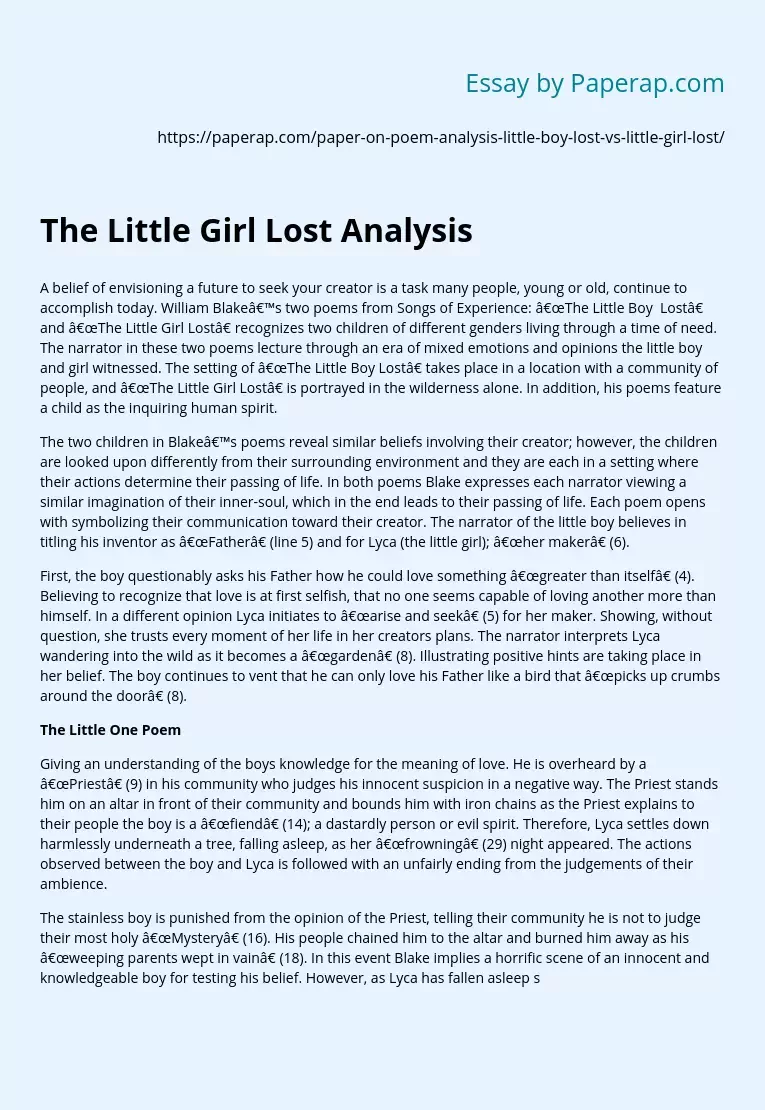The Little Girl Lost Analysis
A belief of envisioning a future to seek your creator is a task many people, young or old, continue to accomplish today. William Blake’s two poems from Songs of Experience: “The Little Boy Lost” and “The Little Girl Lost” recognizes two children of different genders living through a time of need. The narrator in these two poems lecture through an era of mixed emotions and opinions the little boy and girl witnessed. The setting of “The Little Boy Lost” takes place in a location with a community of people, and “The Little Girl Lost” is portrayed in the wilderness alone.
In addition, his poems feature a child as the inquiring human spirit.
The two children in Blake’s poems reveal similar beliefs involving their creator; however, the children are looked upon differently from their surrounding environment and they are each in a setting where their actions determine their passing of life.
In both poems Blake expresses each narrator viewing a similar imagination of their inner-soul, which in the end leads to their passing of life. Each poem opens with symbolizing their communication toward their creator. The narrator of the little boy believes in titling his inventor as “Father” (line 5) and for Lyca (the little girl); “her maker” (6).
First, the boy questionably asks his Father how he could love something “greater than itself” (4). Believing to recognize that love is at first selfish, that no one seems capable of loving another more than himself. In a different opinion Lyca initiates to “arise and seek” (5) for her maker.
Showing, without question, she trusts every moment of her life in her creators plans. The narrator interprets Lyca wandering into the wild as it becomes a “garden” (8). Illustrating positive hints are taking place in her belief. The boy continues to vent that he can only love his Father like a bird that “picks up crumbs around the door” (8).
The Little One Poem
Giving an understanding of the boys knowledge for the meaning of love. He is overheard by a “Priest” (9) in his community who judges his innocent suspicion in a negative way. The Priest stands him on an altar in front of their community and bounds him with iron chains as the Priest explains to their people the boy is a “fiend” (14); a dastardly person or evil spirit. Therefore, Lyca settles down harmlessly underneath a tree, falling asleep, as her “frowning” (29) night appeared. The actions observed between the boy and Lyca is followed with an unfairly ending from the judgements of their ambience.
The stainless boy is punished from the opinion of the Priest, telling their community he is not to judge their most holy “Mystery” (16). His people chained him to the altar and burned him away as his “weeping parents wept in vain” (18). In this event Blake implies a horrific scene of an innocent and knowledgeable boy for testing his belief. However, as Lyca has fallen asleep she mentally explores into a positive paradise. Surrounded by the “beasts of prey” (34), a lion and lioness examine her to be some form of goddess or purity.
Without harm, the lion (symbolizing her maker) disrobes Lyca and takes her back to their cave to sleep. This also symbolizes her creator removing her soul from her material body peacefully in death. Futhermore, Blake indicates a different setting behind each child that aids them to their passing of life. The boy seems to be in a small town where everyone was raised with the same impression of their holy Father. The boy who was caught questioning his Father was punished for reasoning he did not understand. The community “burn’d him in a holy place, / Where many had been burn’d before” (21-22).
This resembles the Priest trying to save him from the wrong acceptance and was helping the boy by burning him in a holy place, which the community believed was the right thing to do. Lyca is surrounded by the “desart wild” (7) by herself with no one near to harm her. Faithful Lyca lays asleep against a peaceful tree in the wilderness with the lion; a king, trampling upon her without being alarmed to bring her back to his “cave” (52) where she rest in peace. The two poems have shown many meanings and imagination on trusting your beliefs.
Reading and analyzing over these poems have made me think more about my understandings and the trust I respect myself to feel toward my creator. Blake mentions these two poems with children of different gender and having strong assumptions on their interactions with their creator. Furthermore, nourishes the idea of the children being judged by their surroundings and making the setting very important from the reader to the character in the poem. In my belief these two poems have taught me more about faith and the actions that could happen at any point in time.
The Little Girl Lost Analysis. (2019, Dec 05). Retrieved from https://paperap.com/paper-on-poem-analysis-little-boy-lost-vs-little-girl-lost/

